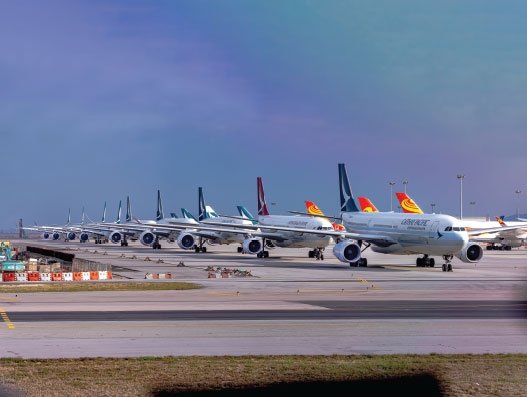
FROM MAGAZINE: Covid-19 cripples global air cargo supply chain
It is said when China sneezes, the rest of the world catches cold. How true? With Covid-19 originating in Wuhan, claiming several lives and now becoming a global pandemic, China decides to shut its factories to deal with SARS-Cov-2. But the world now suffers not just from Covid-19 but from a severe acute shortage of gl

It is said when China sneezes, the rest of the world catches cold. How true? With Covid-19 originating in Wuhan, claiming several lives and now becoming a global pandemic, China decides to shut its factories to deal with SARS-Cov-2. But the world now suffers not just from Covid-19 but from a severe acute shortage of global supplies. How serious is the issue of excessive reliance on Chinese-built global supply chains and its impact on the global air cargo industry?
In July 2019, the international research institution, Mckinsey Global Institute published a report named ‘China and the World: Inside the dynamics of a changing relationship’ which in short compares how much China is exposed to the world versus world is exposed to China and analyses potential opportunities and threats due to this relationship.
The report reads, “The country is becoming less exposed in economic terms to the rest of the world. However, reflecting China’s rise to being the world’s second-largest economy and its leading trading nation, the rest of the world is becoming more exposed to China. Our simulation shows that $22 trillion to $37 trillion of economic value (equivalent to about 15 to 26 percent of global GDP by 2040) could be at stake from less or more engagement between China and the world.”
The researchers would have never thought that they would get an opportunity to test their premises as fast as in just five months. The outbreak of Covid-19 at the central Chinese city of Wuhan at the end of December 2019 and its eventual spreading into South Asia, Middle East and Europe have kept the global air cargo, and in fact the global economy, at the brink of another recession.
 Source: CLIVE Data Services
Source: CLIVE Data Services
Right now, close to 40 percent of total cargo capacity has been stripped from the Asia-Europe and Trans-Pacific East Bound (TPEB) tradelanes.
$30 billion revenue loss for Asia Pacific airlines
International Air Transport Association (IATA) in its initial assessment predicted that airlines in the Asia-Pacific will suffer a reduction of $27.8 billion from their revenues. When you close a supply chain for a length of time you then put a financial burden on organizations and companies to continue on a financially strong position. So there is now a heightened risk that the global economy falls into a recession and then it will have an impact on the air cargo industry also.
Glyn Hughes, global head of cargo, IATA said “When we finished 2019, we came back from 12 months of consecutive industry contraction. We had a forecast over 2 percent growth in 2020 with the ending of trade tensions and signing of the phase-1 trade agreement between the US and China. We were expecting a return to growth this year.”
 PHOTO: Reuters
PHOTO: Reuters
“Unfortunately, nobody could foresee the impact of what occurred in Wuhan and the coronavirus will have not just on the air cargo industry but, in fact, on the global economy. A number of supply chains have been dramatically affected. China is such a significant component of the global economy that it is impacting every region in the world,” he added.
Niall van de Wouw, managing director, Clive Data Services (the company that introduced an improved and dynamic methodology to calculate air cargo load factor) said “The situation is unique and the magnitude of its impact on global air cargo is unprecedented. Because China is not only an important market but also the yield obtained by airlines from China is much higher than they could get from other markets. The decrease of airfreight volumes out of China has resulted in the dynamic load factor from Europe & Middle East to China and Hong Kong being higher than the westbound load factor for the first time in 25 years.”
No belly available
In fact, most passenger airlines have stopped operations to/from China at least until March/April and some have even suspended till May/June thus removing the belly capacity by which Chinese market moved 45 percent of all its cargo.
Mark Sutch, Regional General Manager – South Asia, Middle East and Africa, Cathay Pacific Airways said “For us, Hong Kong is a huge cargo hub and there has been a significant impact, but one thing to point out is as a multi-carrier, in other words, a cargo operator and a passenger operator, we’ve been able to manage the capacity quite well. We haven’t changed our freighter schedule. Due to the reduction in the belly space capacity, not only by Cathay but also by other airlines, there is a lot of demand for cargo in a limited capacity environment. The freighters are highly utilised.”
 PHOTO: China’s Xinhua News Agency
PHOTO: China’s Xinhua News Agency
Rippling effect on the air transport network
The Covid-19 also had some indirect effect on the economy all world regions and thus reducing the cargo volumes significantly even between countries not affected. As the factories of china are shut inventories of the US and Europe are also depleting. The IATA research has shown that traffic has collapsed on key Asian routes and that this is rippling throughout the air transport network globally, even between countries without major outbreaks of Covid-19.
Max Conrady, Senior Vice President Cargo, Fraport AG said “We could see an increase in freight and service rates. But they are direct effect; there are also indirect effects of coronavirus like disruptions in the supply chain in Germany. The German car manufactures that rely on electronic parts coming from China are running short of supplies due to factory shutdowns. 25 percent of middle-sized German manufacturers are affected. Export of fabricated goods from Germany is slowing down because the prefabricated goods coming from China are missing.”
“Automobile, machinery parts, consumer products with reliance on electronic parts are affected. Asia is the largest market for Frankfurt airport especially when it comes to e-commerce, pharmaceuticals and electronic parts. There are many consumer goods imported to china from Germany are also affected. Both the inbound and outbound are affected,” he added.
Chinese exposure
The outbreak has outrightly exposed the overreliance of the global economy on China and its significance for the air cargo industry. On the last week of February, the United States market witnessed the worst week since the financial crisis of 2008 as Dow Jones Industrial Average and the S&P 500 fell by 12 percent and investors rushed to dump stocks.
Companies with more exposure to China, like Apple, Nvidia, Procter & Gamble, Qualcomm and Qorvo, are struggling with production capacity. For example, there is a shortage in iPhone camera lens shipments from the supplier Genius Electronic Optical which will have an effect on the overall production of iPhones.
Global analysts are now calling out for diversification of exposure which will make companies more resilient to an outbreak like Covid-19. The trade tensions between China and the US have already pushed companies to diversify their production centres to other South Asian countries. However, acceleration of such a trend would mean huge shifts in air cargo routes and market though concerns persist.
Neel Jones Shah, executive vice president and global head of airfreight, Flexport said, “We’ve seen a rash of supply chain diversification since the start of the US-China trade war. The smart brands are investing heavily in Southeast Asia and minimizing their exposure to China. For example, in a 2019 analysis of Flexport clients, we found year-over-year airfreight volumes from China only increased by single-digit percentages, while airfreight from the Philippines and Vietnam increased by triple and double-digit percentages, respectively.”
“However, China is still an incredibly important global air cargo market. Compared to neighbouring countries, it has superior logistics infrastructure that’s able to handle the volume and complexity of many products; everything from retail to consumer electronics. Unless you diversified your supply chain prior to Chinese New Year and coronavirus containment practices, there are few current alternatives for shippers moving via airfreight,” he added.
Hughes said “When the trade tensions were escalating with a 25 percent increase in tariffs of certain commodities, it was already impacting the financial viability of focusing on one single market as a major production centre. So if you take last eighteen months there is already been a great deal of investment coming to Vietnam, Malaysia and Turkey.”
Airfreight rates
For as long as Covid-19 impacts the supply chain, customers should anticipate that they will see rising prices on goods coming from China. Rates have increased for exports to China by 3x to 4x from January. Short term costs of supply chain optimization are going to increase, as the market has seen with the US-China trade war before shippers can absorb the burden of increased costs and passing them on to customers.
“It’s proven quite challenging to ship goods by air into China since passenger flights have been cancelled, and now there are heavy backlogs in the U.S. and Europe for China-bound flights. We expect this to get better as most freighter flights are added, but rates could remain elevated for quite some time. Transit times will be longer and prices will likely be higher. Shippers are going to have to get creative during this period in terms of the routes their goods take to reach them, and their priority is going to have to be keeping the supply chain moving, rather than on the short term costs of supply chain optimisation,” said Shah.
“We’re looking closely at the retail exports from China. The apparel industry — especially fast fashion — largely depends on air freight. If the fast fashion industry isn’t able to receive their goods within their typical lead times then they could be in trouble. This is yet another reminder to brands that they need to diversify their supply chains. If they haven’t already, this may prompt them to start investing in bulk space agreements (BSAs) originating from cities like Bangkok, Singapore and Taipei as opposed to concentrating in China,” he added.
Air cargo is standing on the frontline
“Even though it is a crisis, it is the time for the air cargo industry to demonstrate its value. Air cargo operators have continued to fly in fact some have even increase operations to make sure that vital medical aid, water, face masks and other equipment to help the people of China reduce the risk of further spreading of the virus. Once the control of the spreading of the disease has been managed, air cargo industry will be on the frontline to get that vital cargo out of China and to rest of the world where it is vitally needed,” said Hughes.
Steve Townes, Chairman & CEO, ACL Airshop and President, CEO & Founder of Ranger Aerospace said “I personally believe the coronavirus will get worse before it gets better. Our company is hoping for the best but preparing for tough times just in case. For example, we have substantial operations in 16 airports in the entire Asia Pacific area. Some of our staffs are in places like Shanghai and Hong Kong and we are doing everything we can to keep our people safe by allowing them to work on different schedules, working from home and sending masks. But make no mistake, coronavirus at this point of time is a new wild card and it is not good for the air cargo industry.”
This feature was originally published in March 2020 issue of STAT Trade Times.

